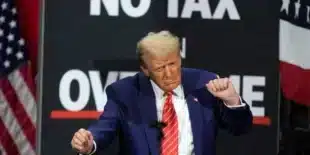Whether it’s tapioca balls or computer chips, Taiwan is increasingly aligning with the United States and distancing itself from China, the world’s second-largest economy that has threatened to take over the democratically governed island if necessary.
This shift is evident in Taiwan’s strategic moves to reduce its reliance on Beijing while strengthening economic and trade ties with the U.S., its strongest ally. The world’s largest maker of computer chips recently announced significant investments in the U.S., supported by incentives from the Biden administration. Concurrently, a Taiwanese semiconductor company announced its withdrawal from mainland China amid the global race for high-tech industry dominance.
These developments highlight Taiwan’s efforts to insulate itself from Chinese pressure as U.S.-China tensions escalate. The shift is also occurring as China’s economic growth weakens and global businesses seek to diversify following pandemic-related supply chain disruptions.
For the first time since 2016, the U.S. surpassed mainland China as the top destination for Taiwan’s exports in the first quarter of this year. Taiwan exported $24.6 billion worth of goods to the U.S. in the first three months, compared to $22.4 billion to mainland China, according to official data.
Additionally, Taiwan’s investments in mainland China dropped to a 20-year low, falling nearly 40% to $3 billion last year. Conversely, investments in the U.S. surged ninefold to $9.6 billion in 2023.
Washington and Taipei signed a trade agreement last year and are currently negotiating the next phase. U.S. lawmakers have also introduced a bill to eliminate double taxation for Taiwanese businesses and workers in the U.S.
“Everything is motivated by … a desire to build Taiwan’s deterrent capability and their resilience, all in support of maintaining the status quo and deterring China from being tempted to take … action against Taiwan,” said Assistant Secretary of State Daniel Kritenbrink.
TSMC, the world’s leading chip manufacturer, announced last month that it would expand its U.S. investments to $65 billion, following a $6.6 billion incentive pledge from the Biden administration to support its facilities in Arizona. This move aims to produce about one-fifth of the world’s most advanced chips by 2030.
Apart from its U.S. investments, TSMC is investing in Japan, a key U.S. ally in the region. Taiwanese conglomerate Foxconn, known for being Apple’s main contractor, is building manufacturing capacity in India, while Pegatron, another Taiwanese firm making iPhone and computer parts, is investing in Vietnam.
King Yuan Electronics Corp., a Taiwanese semiconductor testing and packaging company, recently announced it would sell its $670 million stake in a venture in Suzhou, eastern China. The company cited geopolitical reasons, the U.S. export ban on advanced chips to China, and Beijing’s self-sufficiency policy in technology as factors for this decision.
“The ecological environment of semiconductor manufacturing in China has changed, and the market competition has become increasingly severe,” KYEC said in a statement.
Exports of semiconductors, electronic components, and computer equipment from Taiwan to the U.S. more than tripled from 2018 to reach nearly $37 billion last year. Taiwan has also increased exports of tapioca and its substitutes, key ingredients in boba milk tea, to the U.S. more than threefold between 2018 and 2023, along with more fruits, tree nuts, and farmed fish.
Recent trade data reflect the joint strategy of Taiwan and the U.S. to reorient trade to reduce dependency on China, said Hung Tran, a nonresident senior fellow at the Atlantic Council’s GeoEconomics Center.
The share of Taiwan’s exports to mainland China and Hong Kong fell from about 44% in 2020 to less than one-third in the first quarter of 2024, a significant shift that Tran expects will continue.
Since the 1990s, Beijing has balanced its claim over Taiwan with favorable economic policies to foster closer ties. However, when the independent-leaning Democratic Progressive Party took power in 2016, Taiwan’s new government pursued policies to distance the island from the mainland and strengthen economic ties with other regional countries, particularly in Southeast Asia. Beijing, unhappy with these moves, used economic leverage to pressure Taiwan.
China restricted travel by mainland tourists to Taiwan and suspended imports of Taiwanese seafood, fruits, and snacks. In 2021, it banned Taiwan-grown pineapples over biosecurity concerns, severely impacting Taiwanese farmers who relied on the mainland market.
Ralph Cossa, president emeritus of the Honolulu-based Pacific Forum, said Beijing’s actions have driven Taiwan further away.
Chinese President “Xi Jinping is tactically clever but strategically foolish in many of the decisions he has made; his loyalty tests on Taiwan businessmen and other heavy-handed business practices and decisions have been a major contributor to the success of Taiwan’s” distancing policy, Cossa said.
This policy is expected to continue under Taiwan’s new president, Lai Ching-te, Cossa added.


